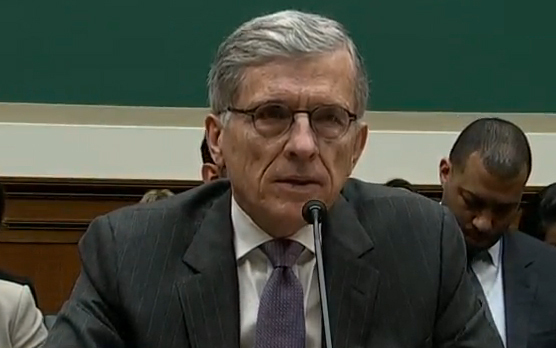FCC Chair: Net Neutrality Is “Right Choice” Because Big ISPs Want “Unfettered Power”
The net neutrality rule hasn’t yet taken effect, but it’s been under heavy political fire for the past few weeks. Lawmakers hauled FCC chairman Tom Wheeler and other FCC commissioners in before a series of Congressional committees to justify (or, for dissenting commissioners, to vilify) the open internet rule. Those hearings, in large part, were heated and adversarial. But in a speech at Ohio State’s law school today, Wheeler took the chance to say everything that committee members cut him off from.
Why is net neutrality so important? Because otherwise, Wheeler said, “private gatekeepers,” like Comcast and Verizon, “will have unfettered power to control commerce and free expression.”
He reiterated his support for the new rule that the FCC voted to adopt late last month, saying, “I believe that the result will be overwhelmingly positive for consumers and innovators,” before delving into the “avalanche of arguments” that have been brandished against it.
“We have been told that our rules are too clear and too uncertain; that we are too much fixated on the past and too much focused on the future; that we will protect the profits of incumbent broadband providers and that we will threaten them,” Wheeler said. “What should we make of these contradictions, this fog of advocacy?”
Wheeler answered his own question: “We should conclude that the biggest broadband providers in the land have one objective: to operate free from control by their customers and free from oversight from government.”
Major ISPs have basically said as much, in their various filings, comments, and public statements through the last year.
“The true choice is between protecting the gatekeepers, or protecting consumers and insurgents,” Wheeler continued. “To understand the problem, it is necessary to understand the power of the biggest ISPs. Consider this simple fact: About three-fourths of American households have zero or one choice for highspeed, wired broadband to their homes. No choice or one choice,” he said, “does not make an attractive marketplace from a consumer’s perspective.”
After this understatement, Wheeler went on to remind the audience that the large incumbent ISPs, monopolies that they are, have both the ability and the incentive — the tools to act and the financially rewarding outcomes — to disadvantage both companies and consumers when it comes to transmitting content. And that, of course, is where a strong net neutrality rule comes in. If screwing with content and connections is made illegal, they probably won’t do it.
As for those lawsuits against the new rule (and the others likely to follow), Wheeler was confident.
“One final prediction,” he concluded: “the FCC’s new rules will be upheld by the courts. The DC Circuit sent the previous Open Internet Order back to us and basically said, ‘You’re trying to impose common carrier-like regulation without stepping up and saying, ‘these are common carriers.” We have addressed that issue, which is the underlying issue in all of the debates we’ve had so far. That gives me great confidence going forward that we will prevail. When that happens, the big winners will be America’s consumers and innovators and our economy as a whole.”
“We will,” finished Wheeler, “finally have strong, enforceable rules that assure that Internet remains open now, and into the future. That is, I am confident, the right choice.”
The full text of chairman Wheeler’s remarks is available on the FCC’s website.
Want more consumer news? Visit our parent organization, Consumer Reports, for the latest on scams, recalls, and other consumer issues.


